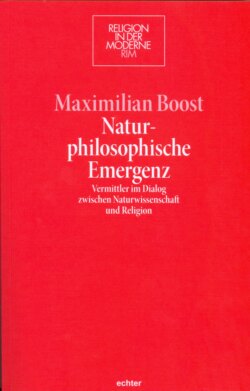Читать книгу Naturphilosophische Emergenz - Maximilian Boost - Страница 19
4.3 Charles Dunbar Broad: „The Mind and its Place in Nature“
ОглавлениеAls herausragendes Werk unter den Hauptwerken der Britischen Emergentisten muss Charles Dunbar Broads „The Mind and its Place in Nature“ (1925) angesehen werden. Broads Theorie der Emergenz besagt, dass eine systemische Eigenschaft eines komplexen Systems genau dann emergent ist, wenn sie nicht aus dem vollständigen Wissen um die Anordnung der Bestandteile dieses Systems und den Eigenschaften, die diese isoliert oder in anderen Systemen zeigen, abgeleitet werden kann:
„Put in abstract terms the emergent theory asserts that there are certain wholes, composed (say) of constituents A, B, and C in a relation R to each other; that all wholes composed of constituents of the same kind as A, B, and C in relations of the same kind as R have certain characteristic properties; that A, B, and C are capable of occurring in other kinds of complex where the relation is not of the same kind as R; and that the characteristic properties of the whole R(A, B, C) cannot, even in theory, be deduced from the most complete knowledge of the properties of A, B, and C in isolation or in other wholes which are not of the form R(A, B, C).“87
Im Zusammenhang mit der Emergenz greift Broad auch die Millsche Definition der letzten Gesetze wieder auf. Denn nach Broad ist ein Gesetz, das die emergente Eigenschaft eines komplexen Systems mit den Eigenschaften der Bestandteile des Systems verknüpft, ein letztes Gesetz („ultimate law“88):
„By this I mean (a) that it is not a special case which arises through substituting certain determinate values for determinable variables in a general law […]. And (b) that it is not a special case which arises by combining two more general laws […]. It is (c) a law which could have been discovered only by studying samples of silver-chloride itself, and which can be extended inductively only to other samples of the same substance.“89
Wie schon seine Vorgänger, nimmt auch Broad sein Beispiel für Emergenz aus dem Bereich der chemischen Verbindungen. Dem Laplaceschen Dämon bei Alexander ähnlich, führt er einen mathematischen Erzengel („mathematical archangel“90) ein, um zu beweisen, dass es eine theoretische Begrenzung des Wissens gibt:
„[A] mathematical archangel, gifted with the further power of perceiving the microscopic structure of atoms as easily as we can perceive hay-stacks, could no more predict the behaviour of silver or of chlorine or the properties of silver-chloride without having observed samples of those substances than we can at present.“91
Selbst wenn man davon ausgeht, dass die mechanistische Theorie der Chemie wahr ist, verschließen sich dem mathematischen Erzengel zumindest die sogenannten sekundären Qualitäten ihrer Ableitung:
„If the mechanistic theory be true the archangel could deduce from his knowledge of the microscopic structure of atoms all these facts but the last. He would know exactly what the microscopic structure of ammonia must be; but he would be totally unable to predict that a substance with this structure must smell as ammonia does when it gets into the human nose. The utmost that he could predict on this subject would be that certain changes would take place in the mucous membrane, the olfactory nerves and so on. But he could not possibly know that these changes would be accompanied by the appearance of a smell in general or of the peculiar smell of ammonia in particular, unless someone told him so or he had smelled it for himself. If the existence of the so-called “secondary qualities,” or the fact of their appearance, depends on the microscopic movements and arrangements of material particles which do not have these qualities themselves, then the laws of this dependence are certainly of the emergent type.“92
Der mathematische Erzengel hat – da in Broads Argument bereits davon ausgegangen wird, dass Chemie und Biologie mechanistisch erklärbar sind – vollkommene Kenntnis aller naturwissenschaftlichen Fakten. Dennoch, so betont Broad, gebe es – aus dem ‚mathematical archangel‘-Argument folgend – in der Welt einiges, was sich prinzipiell und auch in Zukunft nicht mechanistisch erklären lässt, nämlich sekundäre Qualitäten, so z.B. verschiedene Farben, Temperaturen, Gerüche und Tasterlebnisse.93 Dabei gilt:
„[T]he laws connecting the latter [the secondary qualities] with the former [the microscopic particles and events] are certainly of the emergent type. And no complete account of the world can ignore these laws.“94
